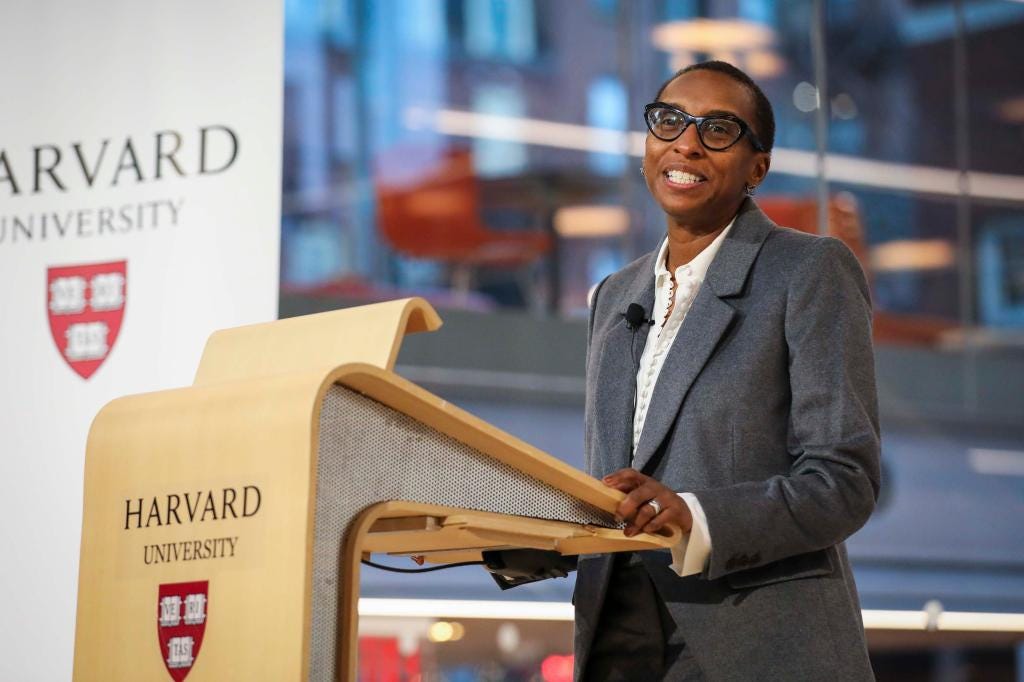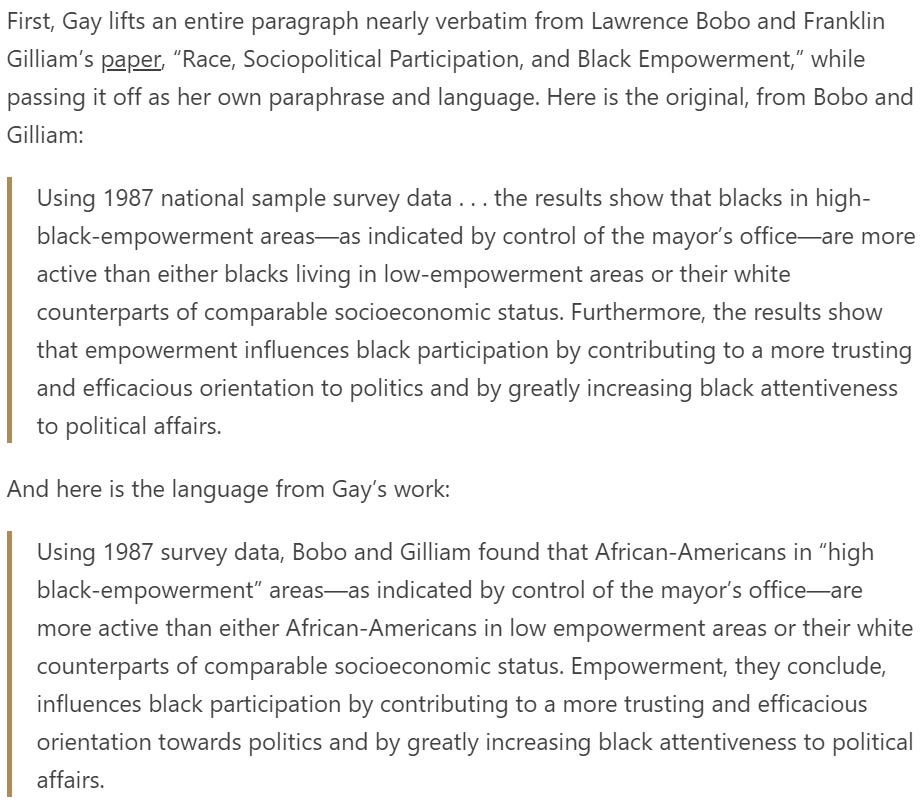Claudine Gay, Plagiarist

Claudine Gay is a pseudointellectual who specializes in being a Diverse Black Female Academic. She first served as a Diverse Black Female Academic at Stanford University, before leaving to become a Diverse Black Female Academic at Harvard University. In 2018, Harvard decided it would be even more Diverse of them to make Gay the Diverse Dean of the Faculty of Arts and Sciences, and in 2023 they thought they could achieve a new pinnacle of Diversity by making her their first Diverse Black Female President. Because Gay’s importance derives entirely from being a Diverse Black Female Academic, she is an underqualified mediocrity, and she has never published anything interesting. In fact, relative to the average tenured Harvard professor, she has never published much of anything at all.
Like a lot of overpromoted mediocrities, Gay does not do her job very well. A mere four months into her presidency, she was drawing fire for her hesitancy to condemn the Hamas attacks on Israel and facing a secret plagiarism inquiry by her university. A month later, her inept answers to questions from U.S. Congresswoman Elise Stefanik on whether calls for Jewish genocide would violate Harvard conduct codes led to sudden calls for her resignation. While the Harvard Corporation considered whether to fire her, friend-of-the-blog Christopher Rufo broke the plagiarism story on his Substack. On Wednesday, Harvard finally cleared her of charges of academic wrongdoing and announced she would stay in office, but new plagiarism accusations just keep coming, like a great deluge. There are now so many that I have trouble keeping track of them all, but this Free Beacon article uncovers some of the most damning instances.
Because academia is full of craven and cowardly people on the one hand, and malicious politically motivated people on the other hand, Gay has no shortage of defenders. I am not going to quote them because their statements are stupid and indefensible. Even some of the scholars Gay has plagiarised insist she is not guilty of plagiarism, though a growing number have come forward to state the obvious. What Gay has done in her dissertation and across at least five of her meagre career-total eleven papers is obviously plagiarism, and students at Harvard are very aware that they would be suspended for infractions like these. Gay’s job is not to be a good president or a good scholar, however. Her job is to be a black female president and a black female scholar, and for this reason Harvard will try to keep her around.
Many people believe plagiarism to be the wholesale theft of the papers and ideas of others, because this is the common approach of unsophisticated undergraduates who have not even read the books they’re supposed to be writing about. That is not, however, the only way to plagiarise, and it is emphatically not how scholars plagiarise. Academic plagiarism looks exactly like what Gay has done. It involves the unattributed appropriation of the words and phrases of others, as well and the broader appropriation of their original ideas. I used to be a professor, I have published various books and articles, and for a while I even edited a journal. I know many students and the odd academic who have faced serious consequences for offences much lesser than Gay’s. I have also, somewhat to my amusement, had my own work plagiarised by a very well-regarded and senior scholar.
Accused plagiarists commonly plead that their lapses arise from simple mistakes of note-taking, and Gay has accordingly pledged to request “corrections” for “omitted” “citations and quotation marks.”

Perhaps there is some way to achieve the wide-scale unintentional theft of others’ words via some bizarre practice of secretarial slovenliness, but personally I can’t imagine how that would happen. In truth, most academic plagiarism seems to arise from one of two motives.
Type 1 plagiarism reflects an anxiety about the project of composing competent prose and an inability to command the tone and terminology that journals and dissertation evaluators expect. I guess that if you are so intellectually under-quipped that you can’t differentiate between what is standard terminology and what are the original words of your peers, you could accidentally plagiarise, but being this incompetent is hardly an exoneration. This is why intent doesn’t matter.
Gay definitely seems guilty of Type 1 plagiarism. Consider this instance from Rufo’s original article:

Gay is unable to use her own words to summarise her source. We can tell this is not an instance of forgotten quotation marks, because she has lightly retouched the passage, in one case switching out “blacks” for the more fashionable “African Americans” and in a second case changing “to” to “towards.” (More syllables means more scholarly for somebody like Gay.) You would not do this if your intent was merely to quote somebody else. How are you supposed to de-plagiarise this borrowing? Like this?
“Using 1987 … survey data,” Bobo and Gilliam found that African-Americans “in high black-empowerment areas—as indicated by control of the mayor’s office—are more active than either” African-Americans “in low empowerment areas or their white counterparts of comparable socioeconomic status.” “Empowerment,” they conclude, “influences black participation by contributing to a more trusting and efficacious orientation” towards “politics and by greatly increasing black attentiveness to political affairs.”
To be clear: Gay cites Bobo and Gilliam and is not overtly deceptive in this instance. Especially in light of the relaxed standards to which the Diverse are subject, she would not go down for a minor infraction like this. Here, we’re merely attempting a diagnosis, and it’s clear that Gay doesn’t have either the energy or the ability to compose an independent summary of her source.
This Free Beacon revelation is much worse:

Palmquist and Voss are commenting on data in which “the average turnout rate” decreases. Gay is commenting on different data in which “the average turnout rate” increases. Nevertheless, she has appropriated the entire phraseology of Palmquist and Voss for her own totally different discussion. There is no way that this can be a mistake; on no planet is it appropriate to repurpose a statement in elucidation of one thing in service of elucidating a wholly separate thing. Gay simply doesn’t command the elementary statistical vocabulary to discuss these ideas, so she has taken it from other people who do. This is a Harvard University President.
Because Type 1 plagiarism is very easy to find via word-searches, it is the most commonly uncovered. Type 2 plagiarism, which consists not of petty word theft but of the broader appropriation of others’ theses and ideas, is much more insidious. To identify it, you generally have to be well-versed in the literature of the field and its various debates. I am not about to spend the next six months poking about in the literature on black political representation to convict Gay of Type 2 violations, but happily, it seems that is unnecessary. Rufo has just published an interview with Carol Swain, against whom Gay has committed various Type 1 offences. There, we find that Swain has this to say:
What is bothering me is not just that there’s passages she didn’t put in quotation marks. When I look at her work, I feel like her whole research agenda, her whole career, was based on my work. It bothers me because I know that my work was a big deal in the early 1990s. And I started falling out of favor in 1995 when I started criticizing race-based affirmative action. I thought affirmative action should be means-tested and race-neutral. When I started putting those ideas out, that’s when I started falling out of favor and getting labeled as a conservative, even while I was a Democrat, and blacks started attacking me, calling me a “sellout.”
In other words: Swain’s work fell into obscurity after she went politically off-message. As people stopped reading her books and papers, Gay swooped in to appropriate her “whole research agenda” and make it her own. This is how you’d expect an untalented unoriginal Type 2 plagiarist, bereft of her own originality, to proceed.
Gay is an obvious, blatant incompetent, and anybody who defends this is either a malign actor or a sniveling craven academic loser. If she wants to stay in education, she should resign and find a job teaching in obscurity at an elementary school somewhere.